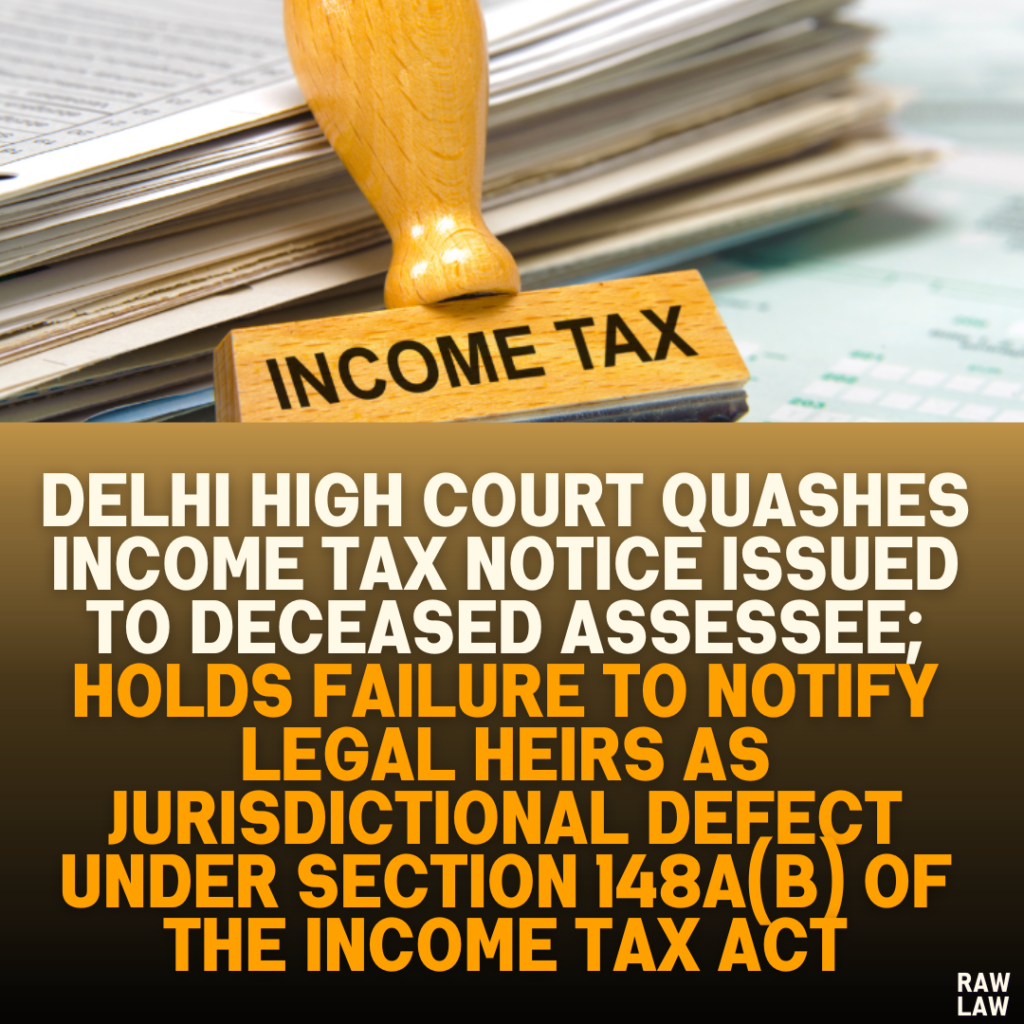Court’s Decision:
The Delhi High Court quashed the notice issued to a deceased assessee under Section 148A(b) of the Income Tax Act, 1961, and all consequential proceedings arising from it. The court held that such a notice is invalid as it does not fulfill the jurisdictional requirement that notices be issued to the legal heirs or representatives of the deceased. This is a mandatory procedural safeguard to ensure fair and lawful reassessment proceedings.
Facts of the Case:
- Deceased Assessee: The original assessee passed away on July 30, 2021, prior to the issuance of the notice.
- Notice Issued: On March 30, 2023, the Income Tax Department issued a notice under Section 148A(b), claiming that the assessee had unreported financial transactions amounting to ₹14,55,000 for the Assessment Year 2019-2020.
- Response by Legal Heir:
- The deceased’s son and legal heir responded promptly, submitting a death certificate and asserting that the notice was void as it was issued to a deceased individual.
- Despite this, the department issued further notices under Section 148A(d) and Section 148, treating the financial transactions as taxable income.
Issues Raised:
- Validity of Notice: Can a notice under Section 148A(b) be issued to a deceased person?
- Obligation to Notify Legal Heir: Does failing to issue a notice to the legal heir render the proceedings invalid?
- Applicability of Section 159: Can the department cure the defect by invoking Section 159, which deals with the liability of legal representatives?
- Applicability of Section 292B: Is the defect curable as a procedural mistake under Section 292B?
Petitioner’s Arguments:
- Invalidity of the Notice:
- The notice was issued to a deceased individual, violating the foundational jurisdictional requirement under Section 148 of the Income Tax Act.
- The defect was substantial, not procedural, and could not be rectified under Section 292B.
- Failure to Notify Legal Heir:
- Section 159 requires that notices be issued to legal representatives of the deceased. This was not done, rendering the entire process invalid.
- Jurisdictional Bar:
- Since the notice was void ab initio, all subsequent proceedings lacked jurisdiction and must be quashed.
Respondent’s Arguments:
- Section 159: The department argued that proceedings could continue against legal representatives under Section 159 of the Act, even if the initial notice was flawed.
- Defect Curable Under Section 292B: They contended that the defect in the notice was procedural and could be cured under Section 292B, which protects against invalidation due to technical errors.
Analysis of the Law:
1. Jurisdictional Requirement:
- The court clarified that the issuance of a valid notice under Section 148 is the cornerstone of reassessment proceedings. Notices must be issued to a living person or their legal representative after death. Issuing a notice to a deceased person is a jurisdictional defect, not a procedural one.
2. Section 159:
- Section 159 allows proceedings to continue against the legal representatives of a deceased person, provided the original proceedings were initiated during the person’s lifetime.
- In this case, the proceedings were initiated after the assessee’s death, and no notice was issued to the legal heir. Therefore, Section 159 was inapplicable.
3. Section 292B:
- Section 292B prevents invalidation of proceedings due to technical errors if the intent and purpose of the law are met.
- However, the court ruled that issuing a notice to a deceased person is a jurisdictional defect that cannot be cured by Section 292B.
Precedent Analysis:
- Savita Kapila v. Assistant Commissioner of Income Tax (2020):
- In similar circumstances, the court held that notices issued to deceased persons are invalid and cannot be rectified, even if alternative remedies like appeals exist.
- Dharamraj v. Income Tax Officer (2022):
- Reiterated that issuing notices to deceased persons violates jurisdictional prerequisites and renders reassessment proceedings void.
Court’s Reasoning:
- The court emphasized that the issuance of a valid notice is a “sine qua non” (essential precondition) for reassessment proceedings.
- It quoted from previous judgments:“The sine qua non for acquiring jurisdiction to reopen an assessment is that notice under Section 148 should be issued to a correct person and not to a dead person.”
- The court concluded that:
- Since no notice was issued to the legal heir under Section 159, the jurisdictional requirement was unmet.
- The defect was substantive, rendering the notice and subsequent proceedings void.
Conclusion:
- The court allowed the writ petition, quashing the notice issued under Section 148A(b) and all consequential proceedings.
- It emphasized that notices must be issued to the correct person, ensuring procedural fairness and adherence to jurisdictional requirements.
Implications:
- For Tax Authorities:
- Tax departments must exercise due diligence in verifying the status of assessees before issuing notices.
- Any reassessment notices issued to deceased persons without notifying legal heirs are void and unenforceable.
- For Legal Representatives:
- Legal heirs can challenge reassessment proceedings initiated against deceased individuals, ensuring they are not burdened with improper tax liabilities.
